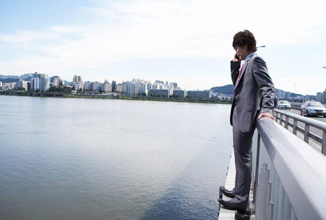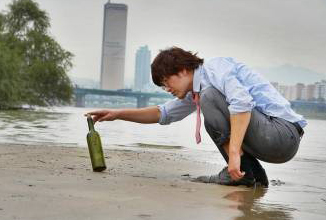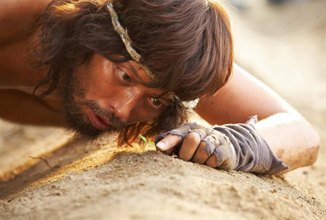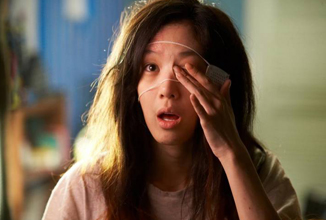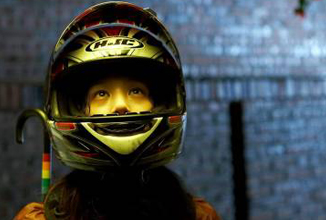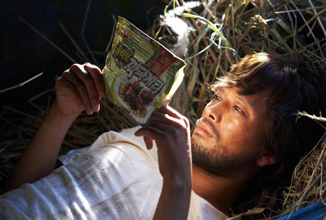Synopsis:
Sung-geun (Jeong Jae-yeong) is at the end of his tether: His girlfriend has dumped him, he's treated by many as a rather incompetent and largely worthless individual, and his failure to meet his loan repayments to the Happy Loans company (with insane amounts of extra interest having accrued as a result) has left him with massive debts. Utterly fed up with life and seeing no way out of his spiralling problems, he attempts to commit suicide by throwing himself off a bridge, but he can't even manage to succeed at that and instead finds himself castaway on an "island" in the middle of the Han river.
Meanwhile, Jung-yeon (Jeong Ryeo-won) hasn't left her room for three years. Her self-imposed exile a deliberate and concerted effort to prevent in-person interactions, she has invented an altogether fake online persona, which serves as her 'life', and even answers her mother by text message. Each night she opens her curtains and takes pictures of the moon (because there's no-one there) and twice a year during the Civil Defence Drill she takes photos of the empty city streets. During one of these bi-annual drills, she spots the letters H E L P scrawled in the sand on Bam Island, in the Han river, and on searching further through her camera's telescopic lens, she discovers Sung-geun.
Over time, Jung-yeon begins to believe that she has found a kindred spirit in the man she calls 'the lonely alien' and, becoming increasingly invested in connecting with him, finally decides that she must send this castaway a message in a bottle…
Review:
Anyone residing in a modern-day metropolis in any country in the world will doubtless be aware of the breakneck pace of life in cities that never sleep; the (either enforced or self-imposed) anonymity caused by the masses only having time to focus on themselves and their own lives, issues and/or financial problems; and the increasing difficulty of making, or keeping, one-on-one human connections. While some flourish in situations such as these, others find themselves increasingly pushed away - left searching for hope, understanding and connection where none seems to exist - and are ultimately faced with a choice of either finding other ways to connect, shutting off from the outside world or even giving up on life completely.
When we first meet Sung-geun, he has already virtually decided that his life is no longer worth living, with a phone call detailing the extent of his financial woes being all that's needed to push him over the edge, as it were. His subsequent predicament of being a castaway on Bam Island (a real-life conservation area/island in the middle of the Han river) serves to accent both the underlying narrative themes and bring a quirkiness to proceedings from the outset, as well as allowing a "fish out of water" scenario, so prevalent in Korean cinema over the years, to be created:
While Sung-geun's situation is like nothing he has experienced before, his place in the overall scheme of things hasn't actually changed to any great degree: He's still utterly alone on the very outskirts of society (literally) and though city life is within his field of vision (he can see the Seoul cityscape from the island - hence Bam island being an utterly inspired choice of setting), he is nonetheless separate from it through no choice of his own, which has essentially always been the case.
However, what his newly enforced Robinson Crusoe lifestyle does push him to is self-reliance and self-belief, with no-one to tell him he's wrong or too old or that he will fail, and by the time he receives the first message in a bottle from Jung-yeon, he has already built up enough confidence in himself to be able, and willing, to let this mysterious lady into his life. The question is how he'll manage to build that connection with seemingly no way off the island?
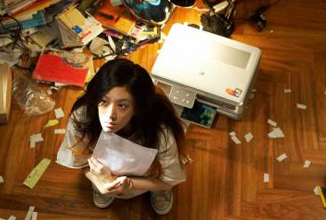 |
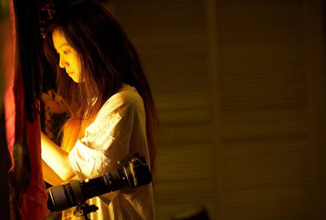 |
Though both Sung-geun and Jung-yeon's ultimate character arcs are the search for connection leading to hope for the future, Jung-yeon's story, in some respects, sits as the polar opposite to his:
The only clue we're given to Jung-yeon's past is the large scar on her forehead but, whatever its cause, it has clearly played a large part in her decision to utterly cut herself off from the outside world and while her (completely fake) online postings and persona initially seem to provide all the interaction she needs, before long she is to learn that digital responses can be every bit as cruel as those in the real world and soon she too must endeavour to find an altogether new means of connection. However, even interactions as small as a message in a bottle can only be undertaken if she manages to leave her room, and in a city full of people how she can achieve that without coming face-to face with them is an altogether new problem for her.
Ultimately, while Sung-geun gradually learns to rely on himself, Jung-yeon has no option but to (eventually) admit that she can't progress alone, and her messages in bottles to Sung-geun come to mean as much to her, her hopes, dreams and life, as they do to the 'lonely alien' on Bam Island.
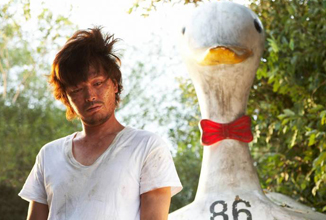 |
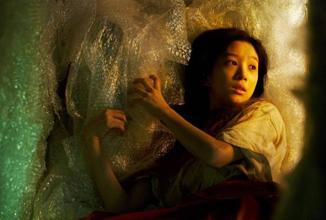 |
There is such a myriad of perfectly beautiful, warm and gently funny moments in Castaway on the Moon, that detailing one or two would be a largely pointless exercise and could never come close to showing just how nuanced and intelligently realised each and every single one of them is. Suffice to say that they add to the overall success of the film to a huge degree and allow the main characters to come across as incredibly likeable. Each of the personality traits and eccentricities of our hero and heroine (Sung-geun's constant conversations/arguments with both himself and inanimate objects, and Jung-yeon's perception of herself as an astronaut complete with motorcycle helmet, to name but two) extend this yet further to ensure that though Sung-geun and Jung-yeon are, for a large part of the film, totally alone, audience members will actively want to join them in their wacky, eccentric world. In fact, perhaps that's exactly the kind of connection both of them ultimately, and so desperately, need.
One thing is for sure: Only an inspired piece of filmmaking could make you believe that there is hope to be found at the bottom of a packet of black bean noodles, but believe you will.
Cinematically, Castaway on the Moon is utterly gorgeous with visuals that are truly beautiful from start to finish. Of these, the scenes showing Jung-yeon's day-to-day life in her room stand out the most (and that's really quite something considering the overall visual accomplishments of the film) and these are combined with perfectly chosen camera frames and angles (for example, Jung-yeon appearing to help Sung-geun move his 'duck house' by pushing her finger in front of her camera lens) to underline the growing connection between the two - even before any real interaction takes place.
A deliberately off-kilter and playful musical score completes the picture (in more ways than one) and deftly compliments the narrative to a tee.
Cast:
Jeong Jae-yeong (as Sung-geun) is an incredibly prolific actor. In fact, if you were to list every film that he's starred in, you'd be writing for a protracted amount of time. However, his performance in Castaway on the Moon is easily one of his best, with the characterisation of Sung-geun allowing him to show an accomplished talent for comedy and drama all rolled into one.
Jeong Ryeo-won is a much newer face in Korean cinema, but her portrayal of Jung-yeon is nonetheless perfectly nuanced throughout. There is a quirkiness to her performance that outstrips even Jeong Jae-yeong, a quality that can also be seen in some of her subsequent work, and it is blatantly clear that she revelled in her role.
The combination of these two amazing performances takes Castaway on the Moon to a level that would not otherwise have been possible and, ultimately, neither one warrants criticism in any respect.
Summary:
Castaway on the Moon deftly combines social commentary with one of the warmest and gently funny narratives of recent memory to create what can only be described as a classic piece of Korean cinema, and let's face it, only inspired filmmaking could make you believe that there is hope to be found at the bottom of a packet of black bean noodles... but believe you will.
|


